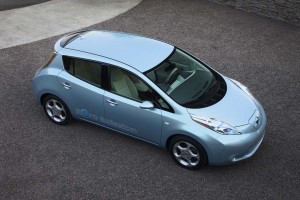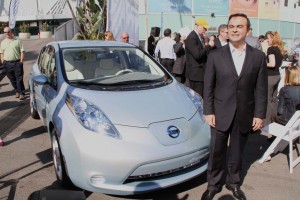
With the 2011 Nissan Leaf only set to begin fleet sales later this year, the maker already claims to have nearly 20,000 retail orders in hand.
Like it not, the electric car is here to stay, Carlos Ghosn, CEO of the Renault-Nissan Allliance, said during a whirlwind visit to Detroit.
The Japanese side of the alliance, in particular, is betting heavily on battery power, with its first battery-electric vehicle, or BEV, the Nissan Leaf, due to go on sale late this year. Other models, including a luxury BEV for the Infiniti brand, are set to follow.
The first-year production of the electric-powered Nissan Leaf is already sold out, Ghosn said, noting the Japanese automaker already has 13,000 orders from customers in the U.S. and another 6,000 orders from buyers in Japan, with more pouring in every day.
Initially, Nissan plans to offer the 2011 Leaf to fleet buyers, but for 2012 it will go into retail sale, and in the U.S., the orders have come from private citizens not government organizations, stressed Ghosn.
“I’m not talking about Federal Express or the government. I don’t think we’re going to have a problem marketing and selling these cars for the first two or three years,” said Ghosn, noting that federal tax incentives –worth $7,500 – have made the Leaf very popular in California, which is expected to be the largest battery car market in the States.
Ghosn said he didn’t want to engage in public debate over the merits of electric vehicles with executives from Honda, which recently said it didn’t believe electric vehicles would be commercially viable for a number of years.
“We understand you’re going to have a lot of pros and cons,” said Ghosn, adding that, “We feel very good about (electric vehicles),” noting surveys around the world indicate between 8% and 10% of consumers are interested in BEVs.
Ghosn said Nissan’s plans to build 500,000 electric vehicles annually by the middle of the decade are actually modest in a global market of 70 million vehicles.
While the Leaf is a subcompact – like many of the other battery-powered vehicles the industry is planning to bring to market — not all of the Nissan’s electric vehicles will be small cars, hinted Ghosn. Nissan also is planning for larger electric sedans, as well as commercial vehicles.
The biggest uncertainty about electric vehicles is the battery. Even the most lithium-ion technology is costly and limited in range. The Leaf, for example, is expected to get only about 100 miles per charge, initially – though senior Nissan officials have told TheDetroitBureau.com that they hope to more than double that in the coming years.
The range issue has convinced some makers to opt for alternate technologies like plug-in hybrids or extended-range electric vehicles. The best-known E-REV is the Chevrolet Volt, also due to market later this year, and capable of getting about 40 miles per charge before its internal combustion engine fires up.
Ghosn remains convinced that pure BEVs are going to succeed, however. In a world where most motorists drive less than 100 miles per day, the Brazilian-born executive insisted, the range of a pure electric vehicle is quite adequate to meet their needs. “We don’t need a range extender,” he concluded.


Is Ghosn saying the Leaf is “sold out” based on the number of $99 refundable deposits?